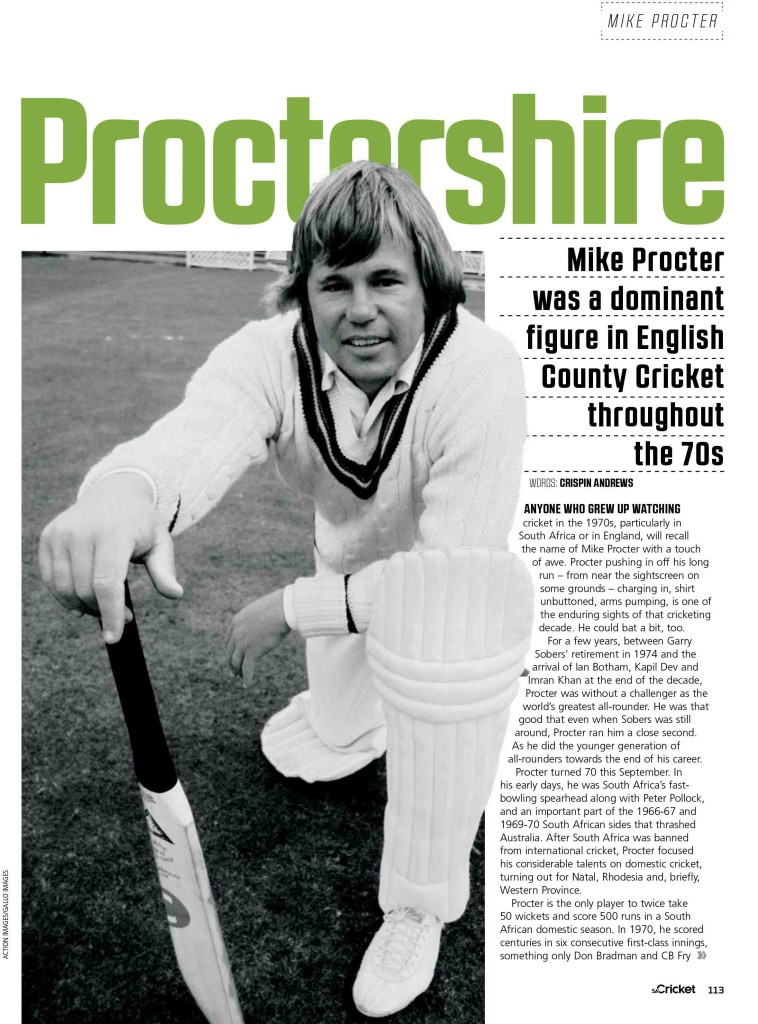Mike Procter, who featured in the October-December edition of SA Cricket magazine, is our Legend of the Week.
Anyone who grew up watching cricket in the 1970s, particularly in South Africa or in England, will recall the name of Mike Procter with a touch of awe. Procter pushing in off his long run – near the sight screen on some grounds – charging in, shirt unbuttoned, arms pumping, is one of the enduring sights of that cricketing decade. He could bat a bit, too.
For a few years, between Garry Sobers’ retirement in 1973, and the arrival of Ian Botham, Kapil Dev and Imran Khan at the end of the decade, Procter was without a challenger as the world’s greatest all-rounder. He was that good, that even when Sobers was still around, Procter ran him a close second. As he did the younger generation of all-rounders towards the end of his career.
Procter turned seventy this September. In his early days, he was South Africa’s fast-bowling spearhead along with Peter Pollock, and an important part of the 1966-67 and 1969-70 South African sides which thrashed Australia. After South Africa was banned from international cricket, Procter focussed his considerable talents on domestic cricket, turning out for Natal, Rhodesia and briefly Western Province.
Procter is the only player to twice take 50 wickets and 500 runs in a South African domestic season. In 1970, he scored centuries in six consecutive first class innings, something only Don Bradman and CB Fry had managed previously, and no one has done since.
‘Proccy bowled huge inswingers at 140km/h-plus,’ Barry Richards stays, who played with Procter for South Africa and against him in domestic cricket in South Africa and England. ‘On his day he’d get any world eleven out. He was fearsomely quick, as quick as any of the other mid-seventies pacemen.’
Ali Bacher, who captained Procter in the 1969-70 series adds ‘He was a magnificent batsman, had terrific timing and a very positive batting style. He was also a very astute captain.’ Bacher thinks that if Procter had played more Tests his all-round record would have been second only to Sobers.
Great fast bowler, excellent batsman, good fielder, decent captain. But did he prefer batting or bowling? ‘When I’d taken lots of wickets I liked bowling best,’ Procter tells SA Cricket magazine. ‘If I’d scored big runs, I preferred batting.’ Spoken like a true all-rounder.
Every year for thirteen seasons, Procter travelled to England to play for Gloucestershire. English counties allowed overseas players for the first time in 1968, and Procter, who with Barry Richards had played a few second eleven games for Gloucestershire in 1965, including one against the touring South African team, came to England, as did Garry Sobers, Rohan Kanhai, Asif Iqbal and Clive Lloyd.
Over the next few years, Procter was so influential, fans and opponents, jokingly changed Gloucestershire’s name to Proctershire.
With Procter in the team, Gloucestershire came second in the County Championship in 1969, they’d been in the bottom three for four of the previous five years and bottom twice. The county also won its first one-day trophies, the Gillette Cup in 1973 and the Benson and Hedges Cup in 1977. ‘There was tremendous team spirit in that Gloucestershire side,’ Procter says. ‘We celebrated in fine style.’
In the Benson and Hedges Semi Final, Procter produced perhaps his most famous and memorable performance. Hampshire were Gloucestershire’s opponents and after Gloucester could only manage 180 in their 55 overs, with Richards and Gordon Greenidge in the opposition batting line up, it was odds-on a Hampshire victory.
Then Procter got to work and the rest is history. ‘It wasn’t doing much from over the wicket, but when I went round the wicket, suddenly it started swinging,’ Procter says. ‘The angle helped the ball swing in. Like when an outswing bowler bowls over the wicket from wider of the crease.
Greenidge drove at one, missed and back went the middle stump. Procter would have Trevor Jesty, lbw, and John Rice, bowled, but the second wicket of the four was the most crucial. Falling over to the off-side, Richards was trapped lbw by a Procter in-swinger.
‘It was too much for our guys that day,’ Richards says. ‘Mike got his four in five balls and should have had Nigel Cowley lbw, too, but the umpire gave him not out when Nigel was trapped dead in front
Later in his career, Procter played for Kerry Packer’s World Eleven during World Series Cricket, captained South Africa against the rebel tourists from England, and at one point, in the early eighties, there was even talk of him playing for England. Procter had been there so long he’d qualified to play for them.
After retiring, Procter went on to coach South Africa at the 1992 World Cup and on the 1994 tour of England. He also did TV commentary for a while. Remember an excited Procter and Bill Lawry talking through the final moments of the 1999 World Cup semi-final against Australia?
‘It was fantastic that we did as well as we did in 1992,’ he says. ‘The spirit that tournament was played in, the experience of being part of it. Just fantastic.’
Procter was also the ICC Match referee when Pakistan refused to take the pitch at the Oval in 2006. And when Harbajhan Singh allegedly racially abused Andrew Symonds. Today, he also runs projects for disadvantaged kids, at a school in Ottawa, near, Durban, where he lives
Procter is proud of what he’s achieved in cricket. ‘Personal success didn’t motivate me. If I scored runs and took wickets and we won, it meant something,’ he says. ‘If we lost, it didn’t. I won two trophies with Gloucestershire, won the Super Tests as part of the WSC world team. That was what it was all about.’
Written by Crispin Andrews is a respected freelance cricket writer.







